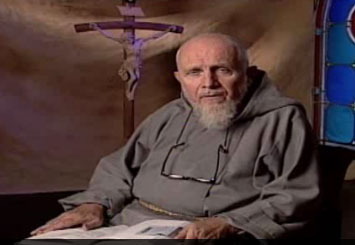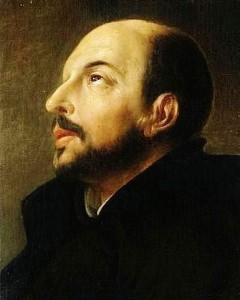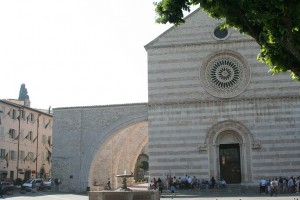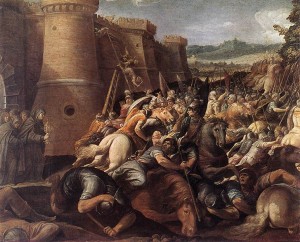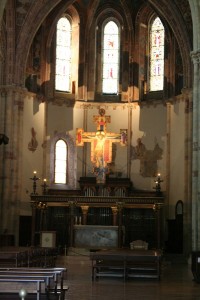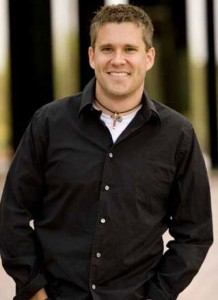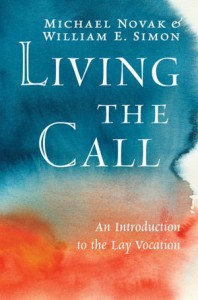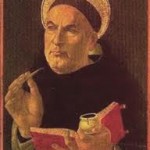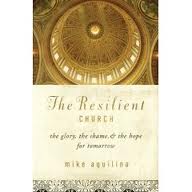The Prayer from Our Humanity – The universal prayer of human beings which flows from the natural law. Â Fr. Groeschel discusses the prayer of cultures from ancient times to the present day. Â He teaches the perspective of paganism and other religions, and what is the nature of true Christian prayer.
This program features Fr. Benedict Groeschel teaching and talking about the Catechism and the Bible with an emphasis on prayer. His discussion of prayer is based on the premise that an essential condition of prayer is devotion- the belief that God is listening and cares for us. In “Prayer in the Catechism”, Fr. Groeschel discusses the various kinds of prayer, including a special emphasis on using scripture when praying. The catechism contains basic Christian teaching formatted for learning and understanding. More information about the Catechism of the Catholic Church may be found on the United States Conference of Catholic Bishops website.
Benedict Joseph Groeschel, CFR is a Catholic priest, retreat master, author, psychologist, activist and has hosted several television programs. He was the director of the Office for Spiritual Development for the Catholic Archdiocese of New York as well as associate director of Trinity Retreat and the executive director of The St. Francis House. He was professor of pastoral psychology at St. Joseph’s Seminary in New York and an adjunct professor at the Institute for Psychological Sciences in Arlington, Virginia.
This program is a production of Pauline Media and the Daughters of St. Paul copyright 1997. Â For more from Pauline Media visit here
Tags: Benedict Groeschel, catholic, catholic podcast, catholic prayer, cathollc spirituality, christian prayer, Groeschel, Joseph Groeschel
This entry was posted on Friday, August 15th, 2014 at 6:42 am
You can follow any responses to this entry through the RSS 2.0 feed.
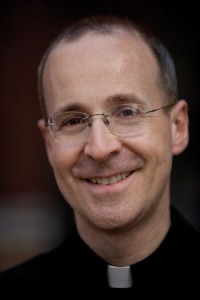
Join Bruce and I, as we discuss the life of both St. Maximilian Kolbe and St. Teresa Benedicta of the Cross with Fr. James Martin, S.J.
[powerpress]
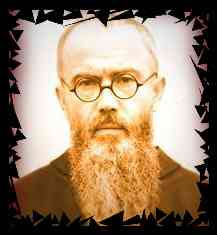 Just look at his eyes…every picture of St. Maximillan Kolbe has those fiery prophetic eyes.
Just look at his eyes…every picture of St. Maximillan Kolbe has those fiery prophetic eyes.
Fueled with the fires of grace from his great love for and devotion to the Blessed Virgin Mary, St. Maximilian was a missionary extraordinaire. A publisher who was a leader in the yet to be defined “New Evangelization”.
They say the blood of the martyrs becomes the seed for the Church. In the case of St. Maximilian, Catholic publishing and broadcasting…all media, would be enriched by his intercession and example. His courage in speaking out against the horrors of the Nazi regime is what placed him in the death camp; it would be his love for Christ and his neighbor that would lead him to give his life for another. And that is what earned him the martyr’s crown.
“In order to discourage escapes, Auschwitz had a rule that if a man escaped, ten men would be killed in retaliation. In July 1941 a man from Kolbe’s bunker escaped. The dreadful irony of the story is that the escaped prisoner was later found drowned in a camp latrine, so the terrible reprisals had been exercised without cause. But the remaining men of the bunker were led out.
‘The fugitive has not been found!’ the commandant Karl Fritsch screamed. ‘You will all pay for this. Ten of you will be locked in the starvation bunker without food or water until they die.’ The prisoners trembled in terror. A few days in this bunker without food and water, and a man’s intestines dried up and his brain turned to fire.
The ten were selected, including Franciszek Gajowniczek, imprisoned for helping the Polish Resistance. He couldn’t help a cry of anguish. ‘My poor wife!’ he sobbed. ‘My poor children! What will they do?’ When he uttered this cry of dismay, Maximilian stepped silently forward, took off his cap, and stood before the commandant and said, ‘I am a Catholic priest. Let me take his place. I am old. He has a wife and children.’
Astounded, the icy-faced Nazi commandant asked, ‘What does this Polish pig want?’
Father Kolbe pointed with his hand to the condemned Franciszek Gajowniczek and repeated‘I am a Catholic priest from Poland; I would like to take his place, because he has a wife and children.’
Observers believed in horror that the commandant would be angered and would refuse the request, or would order the death of both men. The commandant remained silent for a moment. What his thoughts were on being confronted by this brave priest we have no idea. Amazingly, however, he acceded to the request. Apparantly the Nazis had more use for a young worker than for an old one, and was happy to make the exchange. Franciszek Gajowniczek was returned to the ranks, and the priest took his place.
Gajowniczek later recalled:
 I could only thank him with my eyes. I was stunned and could hardly grasp what was going on. The immensity of it: I, the condemned, am to live and someone else willingly and voluntarily offers his life for me – a stranger. Is this some dream?
 I was put back into my place without having had time to say anything to Maximilian Kolbe. I was saved. And I owe to him the fact that I could tell you all this. The news quickly spread all round the camp. It was the first and the last time
For that such an incident happened in the whole history of Auschwitz. A long time I felt remorse when I thought of Maximilian. By allowing myself to be saved, I had signed his death warrant. But now, on reflection, I understood that a man like him could not have done otherwise. Perhaps he thought that as a priest his place was beside the condemned men to help them keep hope. In fact he was with them to the last.’‘
A personal testimony about the way Maximilian Kolbe met death is given by Bruno Borgowiec, one of the few Poles who were assigned to render service to the starvation bunker. He told it to his parish priest before he died in 1947:
 ‘The ten condemned to death went through terrible days. From the underground cell in which they were shut up there continually arose the echo of prayers and canticles. The man in-charge of emptying the buckets of urine found them always empty. Thirst drove the prisoners to drink the contents. Since they had grown very weak, prayers were now only whispered. At every inspection, when almost all the others were now lying on the floor, Father Kolbe was seen kneeling or standing in the centre as he looked cheerfully in the face of the SS men.
Father Kolbe never asked for anything and did not complain, rather he encouraged the others, saying that the fugitive might be found and then they would all be freed. One of the SS guards remarked: this priest is really a great man. We have never seen anyone like him ..
Two weeks passed in this way. Meanwhile one after another they died, until only Father Kolbe was left. This the authorities felt was too long. The cell was needed for new victims. So one day they brought in the head of the sick-quarters, a German named Bock, who gave Father Kolbe an injection of carbolic acid in the vein of his left arm. Father Kolbe, with a prayer on his lips, himself gave his arm to the executioner. Unable to watch this I left under the pretext of work to be done. Immediately after the SS men had left I returned to the cell, where I found Father Kolbe leaning in a sitting position against the back wall with his eyes open and his head drooping sideways. His face was calm and radiant ..’
 So it was that Father Maximilian Kolbe was executed on 14 August, 1941 at the age of forty-seven years, a martyr of charity. The death certificate, as always made out with German precision, indicated the hour of death 12.30.
Father Kolbe’s body was removed to the crematorium, and without dignity or ceremony was disposed of, like hundreds of thousands who had gone before him, and hundreds of thousands more who would follow.
The heroism of Father Kolbe went echoing throughAuschwitz. In that desert of hatred he had sown love. A survivor Jozef Stemler later recalled: ‘In the midst of a brutalization of thought, feeling and words such as had never before been known, man indeed became a ravening wolf in his relations with other men. And into this state of affairs came the heroic self-sacrifice of Father Kolbe.’ Another survivor Jerzy Bielecki declared that Father Kolbe’s death was ‘a shock filled with hope, bringing new life and strength … It was like a powerful shaft of light in the darkness of the camp.’
The cell where Father Kolbe died is now a shrine. Maximilian Kolbe was beatified as Confessor by Paul VI in 1970, and canonized as Martyr by Pope John Paul II in 1981.†– from St. Maximillian Kolbe, saint of Auschwitz
Tags: auschwitz, blessed virgin mary, catholic, catholic podcast, catholic prayer, catholic priest, cathollc spirituality, children, edith stein, father kolbe, fr. james martin, holacaust, James Martin, martyrs, maximillan kolbe, Maximillian Kolbe, nazi death camp, st maximilian
This entry was posted on Thursday, August 14th, 2014 at 6:01 pm
You can follow any responses to this entry through the RSS 2.0 feed.
[powerpress] An anti-pope who is considered a father of the Church and a saint. God’s great 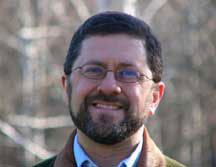 mercy knows no bounds! How does someone who was a self proclaimed pope (and considered the first
mercy knows no bounds! How does someone who was a self proclaimed pope (and considered the first 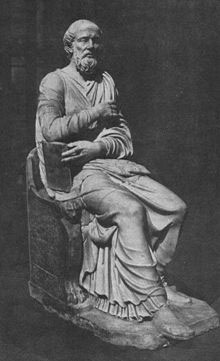 anti-pope in Church history) become a saint? The story of St. Hippolytus is a fascinating one. A greek-speaking priest who who lived in the late 100’s – early 200’s; his writings on the Eucharistic liturgy are some of the most beautiful of all time. Check him out Mike Aquilina’s great blog The Way of the Fathers
anti-pope in Church history) become a saint? The story of St. Hippolytus is a fascinating one. A greek-speaking priest who who lived in the late 100’s – early 200’s; his writings on the Eucharistic liturgy are some of the most beautiful of all time. Check him out Mike Aquilina’s great blog The Way of the Fathers
For more audio from Mike’s visit his Discerning Hearts page
Tags: catholic, catholic podcast, catholic prayer, cathollc spirituality, Church, father, fathers of the church, mercy, mike aquilina, osv, st. paul center for biblical theology
This entry was posted on Wednesday, August 13th, 2014 at 11:43 am
You can follow any responses to this entry through the RSS 2.0 feed.
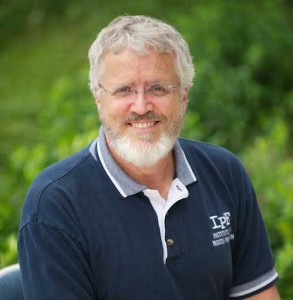 Episode 1 Salvation Begins Now: Last Things First – What are the “Last Things”? Â Death, Purgatory, Heaven, Hell, the Last Judgement, Eternal Life will be explored in this series. Â In this episode we begin the discussion on What is death? Â What is resurrection? What is the connection between the body and the soul?
Episode 1 Salvation Begins Now: Last Things First – What are the “Last Things”? Â Death, Purgatory, Heaven, Hell, the Last Judgement, Eternal Life will be explored in this series. Â In this episode we begin the discussion on What is death? Â What is resurrection? What is the connection between the body and the soul?
[powerpress]
From the Catechism of the Catholic Church:
994Â But there is more. Jesus links faith in the resurrection to his own person: “I am the Resurrection and the life.”544Â It is Jesus himself who on the last day will raise up those who have believed in him, who have eaten his body and drunk his blood.545Â Already now in this present life he gives a sign and pledge of this by restoring some of the dead to life,546Â announcing thereby his own Resurrection, though it was to be of another order. He speaks of this unique event as the “sign of Jonah,”547Â the sign of the temple: he announces that he will be put to death but rise thereafter on the third day.548
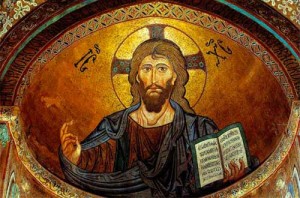 Deacon James Keating, PhD, the director of Theological Formation for the Institute for Priestly Formation, located at Creighton University, in Omaha.
Deacon James Keating, PhD, the director of Theological Formation for the Institute for Priestly Formation, located at Creighton University, in Omaha.
 For more information on the “Institute of Priestly Formation” and for other material available by Deacon Keating, just click here
For more information on the “Institute of Priestly Formation” and for other material available by Deacon Keating, just click here  Don’t forget to pickup a copy of “Communion with Christ” , it is one of the best audio sets on prayer…ever!
Don’t forget to pickup a copy of “Communion with Christ” , it is one of the best audio sets on prayer…ever!
Check out Deacon Keating’s “Discerning Heart” page
Tags: catholic, catholic podcast, catholic prayer, cathollc spirituality, creighton university, death, eternal life, heaven, hell, institute for priestly formation, last things, purgatory
This entry was posted on Tuesday, August 12th, 2014 at 10:48 am
You can follow any responses to this entry through the RSS 2.0 feed.
Dr. Matthew Bunson discusses the life, times and teachings of St. Anslem pt 2
- Born: 1033, Aosta, Italy
- Died: April 21, 1109, Canterbury, United Kingdom
- Full name:Â Anselmo d’Aosta
- Books: Proslogion, More
From Vatican.va, an excerpt from the teachings of Pope Benedict XVI General Audience 2009
Anselm immediately became involved in a strenuous struggle for the Church’s freedom, valiantly supporting the independence of the spiritual power from the temporal. Anselm defended the Church from undue interference by political authorities, especially King William Rufus and Henry I, finding encouragement and support in the Roman Pontiff to whom he always showed courageous and cordial adherence. In 1103, this fidelity even cost him the bitterness of exile from his See of Canterbury. Moreover, it was only in 1106, when King Henry I renounced his right to the conferral of ecclesiastical offices, as well as to the collection of taxes and the confiscation of Church properties, that Anselm could return to England, where he was festively welcomed by the clergy and the people. Thus the long battle he had fought with the weapons of perseverance, pride and goodness ended happily. This holy Archbishop, who roused such deep admiration around him wherever he went, dedicated the last years of his life to the moral formation of the clergy and to intellectual research into theological topics. He died on 21 April 1109, accompanied by the words of the Gospel proclaimed in Holy Mass on that day: “You are those who have continued with me in my trials; as my Father appointed a kingdom for me, so do I appoint for you that you may eat and drink at my table in my kingdom…” (Lk 22: 28-30). So it was that the dream of the mysterious banquet he had had as a small boy, at the very beginning of his spiritual journey, found fulfilment.
Jesus, who had invited him to sit at his table, welcomed Anselm upon his death into the eternal Kingdom of the Father.
“I pray, O God, to know you, to love you, that I may rejoice in you. And if I cannot attain to full joy in this life may I at least advance from day to day, until that joy shall come to the full” (Proslogion, chapter 14). This prayer enables us to understand the mystical soul of this great Saint of the Middle Ages, the founder of scholastic theology, to whom Christian tradition has given the title: “Magnificent Doctor”, because he fostered an intense desire to deepen his knowledge of the divine Mysteries but in the full awareness that the quest for God is never ending, at least on this earth. The clarity and logical rigour of his thought always aimed at “raising the mind to contemplation of God” (ibid., Proemium). He states clearly that whoever intends to study theology cannot rely on his intelligence alone but must cultivate at the same time a profound experience of faith. The theologian’s activity, according to St Anselm, thus develops in three stages: faith, a gift God freely offers, to be received with humility; experience, which consists in incarnating God’s word in one’s own daily life; and therefore true knowledge, which is never the fruit of ascetic reasoning but rather of contemplative intuition. In this regard his famous words remain more useful than ever, even today, for healthy theological research and for anyone who wishes to deepen his knowledge of the truths of faith: “I do not endeavour, O Lord, to penetrate your sublimity, for in no wise do I compare my understanding with that; but I long to understand in some degree your truth, which my heart believes and loves. For I do not seek to understand that I may believe, but I believe in order to understand. For this also I believe, that unless I believed, I should not understand” (ibid., 1).
Dear brothers and sisters, may the love of the truth and the constant thirst for God that marked St Anselm’s entire existence be an incentive to every Christian to seek tirelessly an ever more intimate union with Christ, the Way, the Truth and the Life. In addition, may the zeal full of courage that distinguished his pastoral action and occasionally brought him misunderstanding, sorrow and even exile be an encouragement for Pastors, for consecrated people and for all the faithful to love Christ’s Church, to pray, to work and to suffer for her, without ever abandoning or betraying her. May the Virgin Mother of God, for whom St Anselm had a tender, filial devotion, obtain this grace for us. “Mary, it is you whom my heart yearns to love”, St Anselm wrote, “it is you whom my tongue ardently desires to praise”.
For more visit Vatican.va
Dr. Matthew Bunson, Senior Fellow of the St. Paul Center for Biblical Theology, is one of the United States’ leading authorities on the papacy and the Church.
His books include: The Encyclopedia of Catholic History; The Encyclopedia of Saints; Papal Wisdom; All Shall Be Well; Encyclopedia of the Roman Empire; and The Angelic Doctor: The Life and World of St. Thomas Aquinas; The Pope Encyclopedia; We Have a Pope! Benedict XVI, the first Catholic biography of the Holy Father in the English language; the Encyclopedia of U.S. Catholic History; Pope Francis. His also the editor of OSV’s “The Catholic Answer” magazine.
Tags: catholic, catholic podcast, catholic prayer, cathollc spirituality
This entry was posted on Tuesday, August 12th, 2014 at 10:47 am
You can follow any responses to this entry through the RSS 2.0 feed.
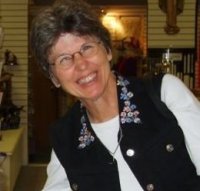 Join Bruce and I as we learn more about the life of St. Jane de Chantal from Teresa Monaghen, of the Pro Sanctity Movement.
Join Bruce and I as we learn more about the life of St. Jane de Chantal from Teresa Monaghen, of the Pro Sanctity Movement.
[powerpress]
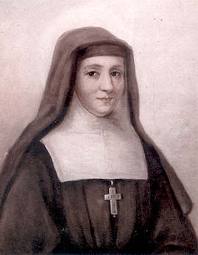 Jane Frances was born in Dijon, France, February 28, 1572.  Her life story is fascinating. She married Christopher, baron of Chantal, at the age of 20. They were deeply in love with each other. Together they would have six children (three died shortly after they were born).  Christopher’s accidental death sent Jane into a deep depression. She was only 28 at the time.  But her faith, helped heal her broken heart (and survive her crazy relatives).
Jane Frances was born in Dijon, France, February 28, 1572.  Her life story is fascinating. She married Christopher, baron of Chantal, at the age of 20. They were deeply in love with each other. Together they would have six children (three died shortly after they were born).  Christopher’s accidental death sent Jane into a deep depression. She was only 28 at the time.  But her faith, helped heal her broken heart (and survive her crazy relatives).
It was said that her first spiritual director was really rigid and not a great fit at all for Jane. But after hearing Fr. Francis de Sales preach one day, she sought him out for direction. Their meeting and subsequent spiritual relationship would change both their lives, and touch  many other lives for generations to come. Jane, under the direction of Francis de Sales, founded the Order of the Visitation of Holy Mary. St. Jane died on this date in 1641 at the age 69. Check out more on her life here.
Any one out there seeking a good and spirit-filled spiritual director, ask St. Jane Francis de Chantal to pray with you. She knows what your are going through!
Â
Tags: catholic, catholic podcast, catholic prayer, cathollc spirituality, order of the visitation of holy mary, pro sanctity, st jane de chantal, teresa monaghen
This entry was posted on Tuesday, August 12th, 2014 at 10:15 am
You can follow any responses to this entry through the RSS 2.0 feed.
 Episode 6Â Â Praying with Scripture: Christian Contemplation and Mediation in the Ignatian tradition w/Fr. Timothy Gallagher
Episode 6Â Â Praying with Scripture: Christian Contemplation and Mediation in the Ignatian tradition w/Fr. Timothy Gallagher
Fr. Gallagher continues to discuss the differences and benefits of meditation and contemplation – the cornerstones of Ignatius of Loyola’s spiritual practice.
[powerpress]
For other episodes in the series visit The Discerning Hearts “Praying with Scripture†page
Father Timothy M. Gallagher, O.M.V., was ordained in 1979 as a member of the Oblates of the Virgin Mary, a religious community dedicated to retreats and spiritual formation according to the Spiritual Exercises of St. Ignatius. Â Fr. Gallagher is featured on the EWTN series “Living the Discerning Life: Â The Spiritual Teachings of St. Ignatius of Loyola”.
For more information on how to obtain copies of Fr. Gallaghers’s various books and audio which are available for purchase, please visit  his  website:   frtimothygallagher.org
 For the other episodes in this series check out Fr. Timothy Gallagher’s “Discerning Hearts†page
Tags: catholic, catholic podcast, catholic prayer, cathollc spirituality
This entry was posted on Monday, August 11th, 2014 at 10:29 am
You can follow any responses to this entry through the RSS 2.0 feed.
[powerpress]
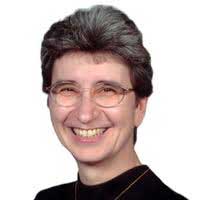 Enter into the life story 0f St. Clare’s life by listening to one of the best storytellers we know…Sr. Joan Mueller. She is enthralling!!!
Enter into the life story 0f St. Clare’s life by listening to one of the best storytellers we know…Sr. Joan Mueller. She is enthralling!!!
St. Clare of Assisi, cofoundress of the Order of Poor Ladies, or Clares, was the first 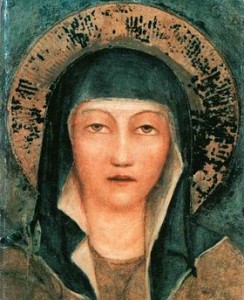 Abbess of San Damiano; born at Assisi, 16 July, 1194; died there 11 August, 1253.
Abbess of San Damiano; born at Assisi, 16 July, 1194; died there 11 August, 1253.
One of the best DVD’s we  have ever seen on the life of Clare and Francis is (and we’ve seen them all) the newest distributed by Ignatius Press. 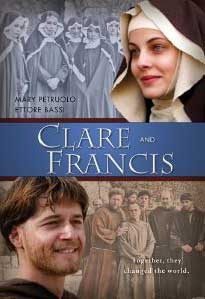 Clare is portrayed as a woman in love with Christ, not a starry-eyed hippy pining over Francis. And she gets equal time…finally. This film is perfect!
Clare is portrayed as a woman in love with Christ, not a starry-eyed hippy pining over Francis. And she gets equal time…finally. This film is perfect!
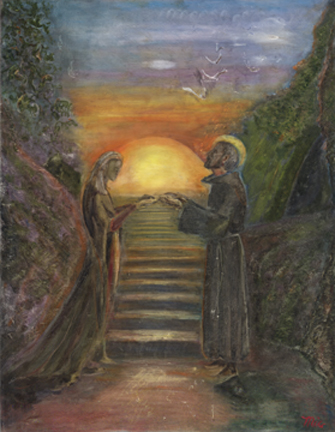 If you ‘d like to see her life summed up in a quick read try here.
If you ‘d like to see her life summed up in a quick read try here.
–
A personal reflection reflection on St. Clare by Kris McGregor:
In 2007, I had a chance to visit Assisi…I just wanted to be near St. Clare. I didn’t plan it, but my hotel ended up being right across the street from St. Clare’s Basilica (it seems wrong to call it a street, it’s width is so small). Really early one morning, I just couldn’t sleep so I got up and began walking around outside of the Basilica. No one was out, all the shops closed, the sun was just coming up. On a whim I thought I would see if the doors of the church were open (thinking to myself of course they wouldn’t be), but to my surprise they opened. So I entered. No one was around. I saw steps leading down to a lower level.  I stepped over the rope blocking the entrance (boorish American that I am) and walked down. The path led down to an area that had a display of relics, like clothing and other items (I assumed 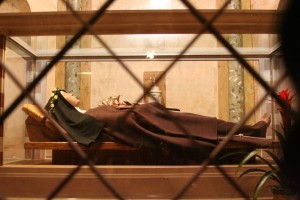 they were Clare’s) and then I turned around and saw something incredible…the crypt of St. Clare. It stopped me in my tracks, so much so that I had to remind myself to breath again. I quietly walked over to the enclosure grates that blocked off getting any closer. I knelt down, and I just started to weep…I just couldn’t help it. It was so quiet, it was such a gift. I began to pray. I brought to St. Clare all the petitions I held so deeply in my heart. And when that was done, silence filled the space. After about 10 minutes, out of nowhere, I could here the sound of the Poor Clare Sisters in the distance chanting their morning prayers. I knelt at that spot, for a good 30 minutes or so, all alone with St. Clare. I then got up, praised God for this special moment and left the basilica.  She’s been with me, in a special way, ever since. St. Clare, pray for us.
they were Clare’s) and then I turned around and saw something incredible…the crypt of St. Clare. It stopped me in my tracks, so much so that I had to remind myself to breath again. I quietly walked over to the enclosure grates that blocked off getting any closer. I knelt down, and I just started to weep…I just couldn’t help it. It was so quiet, it was such a gift. I began to pray. I brought to St. Clare all the petitions I held so deeply in my heart. And when that was done, silence filled the space. After about 10 minutes, out of nowhere, I could here the sound of the Poor Clare Sisters in the distance chanting their morning prayers. I knelt at that spot, for a good 30 minutes or so, all alone with St. Clare. I then got up, praised God for this special moment and left the basilica.  She’s been with me, in a special way, ever since. St. Clare, pray for us.
Tags: catholic, catholic podcast, catholic prayer, cathollc spirituality, creighton university, poor clares, st clare
This entry was posted on Monday, August 11th, 2014 at 10:20 am
You can follow any responses to this entry through the RSS 2.0 feed.
The Sunday, Sunday, Sunday Podcast is a reflection on the upcoming Sunday Mass readings presented by LifeTeen.com and hosted by Mark Hart.
Sunday Readings from the USCCB
Reading 1Â Â 1 KGS 19:9A, 11-13A
Responsorial Psalm  PS 85:9, 10, 11-12, 13-14
Reading 2Â ROM 9:1-5
Gospel  MT 14:22-33
After he had fed the people, Jesus made the disciples get into a boat
and precede him to the other side,
while he dismissed the crowds.
After doing so, he went up on the mountain by himself to pray.
When it was evening he was there alone.
Meanwhile the boat, already a few miles offshore,
was being tossed about by the waves, for the wind was against it.
During the fourth watch of the night,
he came toward them walking on the sea.
When the disciples saw him walking on the sea they were terrified.
“It is a ghost,†they said, and they cried out in fear.
At once Jesus spoke to them, “Take courage, it is I; do not be afraid.â€
Peter said to him in reply,
“Lord, if it is you, command me to come to you on the water.â€
He said, “Come.â€
Peter got out of the boat and began to walk on the water toward Jesus.
But when he saw how strong the wind was he became frightened;
and, beginning to sink, he cried out, “Lord, save me!â€
Immediately Jesus stretched out his hand and caught Peter,
and said to him, “O you of little faith, why did you doubt?â€
After they got into the boat, the wind died down.
Those who were in the boat did him homage, saying,
“Truly, you are the Son of God.â€
Tags: catholic, catholic podcast, catholic prayer, cathollc spirituality
This entry was posted on Friday, August 8th, 2014 at 8:13 am
You can follow any responses to this entry through the RSS 2.0 feed.
Our conversation about St. Dominic with Bert Ghezzi.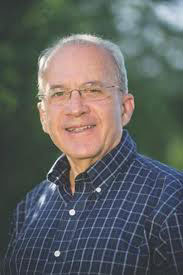
[powerpress]
Spain gives us yet another incredible saint…St. Dominic. He is the founder of the Order of Preachers (so 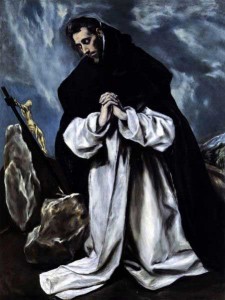 when you see an  “O.P.” behind the name, that’s what’s going on).  Most of us call them the Dominicans.  Born in 1170, he died on this date in 1221. A lot of traveling took place between those years. There is an interesting story that is told that before his birth his mother dreamed that a dog leapt from her womb carrying a torch in its mouth, and “seemed to set the earth on fire.” His name in latin is Dominicanus, which is essentially the “Lord’s Hound”….fascinating. (Parents out there, take note: names matter.)  St. Dominic and his order have been responsible for setting the earth ablaze with the Gospel for over 800 years.
when you see an  “O.P.” behind the name, that’s what’s going on).  Most of us call them the Dominicans.  Born in 1170, he died on this date in 1221. A lot of traveling took place between those years. There is an interesting story that is told that before his birth his mother dreamed that a dog leapt from her womb carrying a torch in its mouth, and “seemed to set the earth on fire.” His name in latin is Dominicanus, which is essentially the “Lord’s Hound”….fascinating. (Parents out there, take note: names matter.)  St. Dominic and his order have been responsible for setting the earth ablaze with the Gospel for over 800 years.
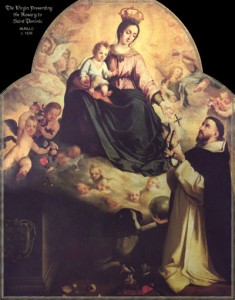 Also, St. Dominic and the Order have contributed considerably to the spread of the devotion to Our Lady, and inparticular, to the Holy Rosary. Another good reason to celebrate his life and legacy today!
Also, St. Dominic and the Order have contributed considerably to the spread of the devotion to Our Lady, and inparticular, to the Holy Rosary. Another good reason to celebrate his life and legacy today!
Also check out the
Discerning Hearts St. Dominic Page
Tags: bert ghezzi, catholic, catholic podcast, catholic prayer, cathollc spirituality, Dominic Page, dominicans, holy rosary, latin, order of preachers, Spain, spirit catholic radio, st dominic
This entry was posted on Friday, August 8th, 2014 at 8:00 am
You can follow any responses to this entry through the RSS 2.0 feed.
Michael Novak is a shining witness of what occurs in the soul when the head makes the journey to the heart. 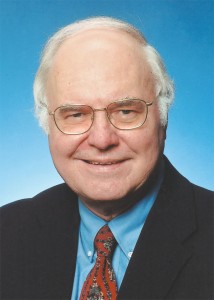  What a gift he is to all of us and what a profound sage of wisdom…when he so-gently speaks, I listen….we all should!  In “Living the Call: An Introduction to the Lay Vocation“, Michael, along with his co-author William E. Simon, Jr, establishes, in Part 1, of the book, the need for the lay vocation in the Church today.  They chronicle that need with a national and global perspective.  They also present how “living the call”  looks in the lives of nine committed  lay faithful working in parish life today.
 What a gift he is to all of us and what a profound sage of wisdom…when he so-gently speaks, I listen….we all should!  In “Living the Call: An Introduction to the Lay Vocation“, Michael, along with his co-author William E. Simon, Jr, establishes, in Part 1, of the book, the need for the lay vocation in the Church today.  They chronicle that need with a national and global perspective.  They also present how “living the call”  looks in the lives of nine committed  lay faithful working in parish life today.
Part 2 is worth it’s weight in gold! It outlines the absolute necessity of  growth in the interior life of the laity.  How essential it is to deepen the spiritual life .  They give voice to  the need to appreciate the desert experiences of our lives as an opportunities for greater unity with Christ; such periods provide the fonts of grace which nurtures the work in ministry.  For anyone  who severs in ministry of any kind, either as an employee or as a volunteer, if you pass this indispensable book by, you do so at your own peril!
[powerpress]
Michael Novak’s website can be found here
 You can find “Living the Call” here
“This is the book that countless Catholic laypeople have been waiting for as they ponder how to respond to Vatican II’s challenge to take more active roles in the life of the Church and to bring Christian principles to life in the secular world. It’s a gem of a book that speaks to laypeople in all walks of life and at all stages of their earthly journeys.â€
Mary Ann Glendon, Learned Hand Professor of Law, Harvard University
Tags: catholic, catholic podcast, catholic prayer, cathollc spirituality
This entry was posted on Sunday, August 3rd, 2014 at 7:29 am
You can follow any responses to this entry through the RSS 2.0 feed.
[powerpress]
This program features Fr. Benedict Groeschel teaching and talking about the Catechism and the Bible with an emphasis on prayer. His discussion of prayer is based on the premise that an essential condition of prayer is devotion- the belief that God is listening and cares for us. In “Prayer in the Catechism”, Fr. Groeschel discusses the various kinds of prayer, including a special emphasis on using scripture when praying. The catechism contains basic Christian teaching formatted for learning and understanding. More information about the Catechism of the Catholic Church may be found on the United States Conference of Catholic Bishops website.
Benedict Joseph Groeschel, CFR is a Catholic priest, retreat master, author, psychologist, activist and has hosted several television programs. He was the director of the Office for Spiritual Development for the Catholic Archdiocese of New York as well as associate director of Trinity Retreat and the executive director of The St. Francis House. He was professor of pastoral psychology at St. Joseph’s Seminary in New York and an adjunct professor at the Institute for Psychological Sciences in Arlington, Virginia.
This program is a production of Pauline Media and the Daughters of St. Paul copyright 1997. Â For more from Pauline Media visit here
Tags: Benedict Groeschel, Catechism, catholic, catholic podcast, catholic prayer, cathollc spirituality, Joseph Groeschel
This entry was posted on Sunday, August 3rd, 2014 at 7:28 am
You can follow any responses to this entry through the RSS 2.0 feed.
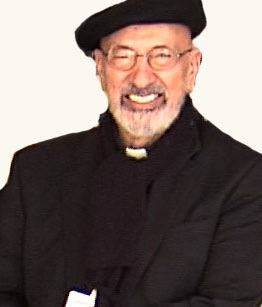 BKL 71 ” Building a Kingdom of Love” – “They all ate and were satisfied” Â
BKL 71 ” Building a Kingdom of Love” – “They all ate and were satisfied” Â
[powerpress]
Gospel MT 14:13-21
When Jesus heard of the death of John the Baptist,
he withdrew in a boat to a deserted place by himself.
The crowds heard of this and followed him on foot from their towns.
When he disembarked and saw the vast crowd,
his heart was moved with pity for them, and he cured their sick.
When it was evening, the disciples approached him and said,
“This is a deserted place and it is already late;
dismiss the crowds so that they can go to the villages
and buy food for themselves.â€
Jesus said to them, “There is no need for them to go away;
give them some food yourselves.â€
But they said to him,
“Five loaves and two fish are all we have here.â€
Then he said, “Bring them here to me, â€
and he ordered the crowds to sit down on the grass.
Taking the five loaves and the two fish, and looking up to heaven,
he said the blessing, broke the loaves,
and gave them to the disciples,
who in turn gave them to the crowds.
They all ate and were satisfied,
and they picked up the fragments left over—
twelve wicker baskets full.
Those who ate were about five thousand men,
not counting women and children.
Msgr. John A. Esseff is a Roman Catholic priest in the Diocese of Scranton. He was ordained on May 30th 1953, by the late Bishop William J. Hafey, D.D. at St. Peter’s Cathedral in Scranton, PA. Msgr. Esseff served a retreat director and confessor to Blessed Mother Teresa. He continues to offer direction and retreats for the sisters of the missionaries of charity around the world. Msgr. Esseff encountered St. Padre Pio, who would become a spiritual father to him. He has lived in areas around the world, serving in the Pontifical missions, a Catholic organization established by Bl. Pope John Paul II to bring the Good News to the world especially to the poor. Msgr. Esseff assisted the founders of the Institute for Priestly Formation and continues to serve as a spiritual director for the Institute. He continues to serve as a retreat leader and director to bishops, priests and sisters and seminarians and other religious leaders around the world.   To obtain a copy of Msgr. Esseff’s book by visiting here  Be sure to visit Msgr. Esseff’s website “Building a Kingdom of Love“
 To obtain a copy of Msgr. Esseff’s book by visiting here  Be sure to visit Msgr. Esseff’s website “Building a Kingdom of Love“
Tags: catholic, catholic podcast, catholic prayer, cathollc spirituality
This entry was posted on Sunday, August 3rd, 2014 at 7:27 am
You can follow any responses to this entry through the RSS 2.0 feed.
Episode 2- What is the relationship between religion and science?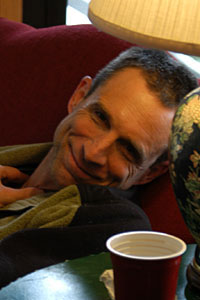
[powerpress]
Question 1 Article 2. Whether sacred doctrine is a science.
Objection 1:Â It seems that sacred doctrine is not a science. For every science proceeds from self-evident principles. But sacred doctrine proceeds from articles of faith which are not self-evident, since their truth is not admitted by all: “For all men have not faith” (2 Thess. 3:2). Therefore sacred doctrine is not a science.
Objection 2:Â Further, no science deals with individual facts. But this sacred science treats of individual facts, such as the deeds of Abraham, Isaac and Jacob and such like. Therefore sacred doctrine is not a science.
On the contrary, Augustine says (De Trin. xiv, 1) “to this science alone belongs that whereby saving faith is begotten, nourished, protected and strengthened.” But this can be said of no science except sacred doctrine. Therefore sacred doctrine is a science.
I answer that, Sacred doctrine is a science. We must bear in mind that there are two kinds of sciences. There are some which proceed from a principle known by the natural light of intelligence, such as arithmetic and geometry and the like. There are some which proceed from principles known by the light of a higher science: thus the science of perspective proceeds from principles established by geometry, and music from principles established by arithmetic. So it is that sacred doctrine is a science because it proceeds from principles established by the light of a higher science, namely, the science of God and the blessed. Hence, just as the musician accepts on authority the principles taught him by the mathematician, so sacred science is established on principles revealed by God.
Reply to Objection 1:Â The principles of any science are either in themselves self-evident, or reducible to the conclusions of a higher science; and such, as we have said, are the principles of sacred doctrine.
Reply to Objection 2:Â Individual facts are treated of in sacred doctrine, not because it is concerned with them principally, but they are introduced rather both as examples to be followed in our lives (as in moral sciences) and in order to establish the authority of those men through whom the divine revelation, on which this sacred scripture or doctrine is based, has come down to us.
For an online version of St. Thomas Aquinas’ “Summa” click here
“Christian Apologetics with Dr. R. R. Reno” explores numerous facets of faith and reason in the life of the Church and the world. Grounded on the work of giants, such as St. Thomas Aquinas, St. Bonaventure, Blessed John Newman, soon-to-be Blessed John Paul II, G. K. Chesterton, Blaise Paschal and Stephen Barr, Dr. Reno helps us to open our minds to make the journey to our hearts.
R. R. Reno is the editor at First Things: A Journal of Religion, Culture, and Public Life, and Professor of Theology, currently on leave from Creighton University. His theological work has been published in many academic journals. Essays and opinion pieces on religion, public life, contemporary culture, and current events have appeared in Commentary, and the Washington Post. In Fighting the Noonday Devil Reno suggests that putting ourselves at the disposal of what is real is what trains us for true piety. His other recent books include Genesis: Brazos Theological Commentary on the Bible and Sanctified Vision: An Introduction to Early Christian Interpretation of the Bible.
Tags: catholic, catholic podcast, catholic prayer, cathollc spirituality
This entry was posted on Friday, August 1st, 2014 at 8:40 am
You can follow any responses to this entry through the RSS 2.0 feed.
Episode 5– Light in the Dark Ages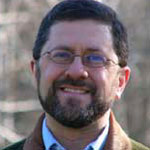
The Resilient Church with Mike Aquilina, offers a fascinating look at the trials and triumphs of the Catholic Church over the past two thousand years. Fast-paced sketches of critical periods in church history give readers perspective on the challenges faced by the church today. Mike Aquilina does not shrink from the realities of the past, including badly behaved leaders and those who betrayed the Lord. Yet he also leaves us all with well-founded hope for the future: God remains faithful in every circumstance and fulfills his promise to remain with his church always. Hosted by Kris McGregor
Also visit Mike’s “Discerning Hearts†page for more audio downloads and information!
Tags: catholic, catholic podcast, catholic prayer, cathollc spirituality
This entry was posted on Friday, August 1st, 2014 at 8:27 am
You can follow any responses to this entry through the RSS 2.0 feed.

